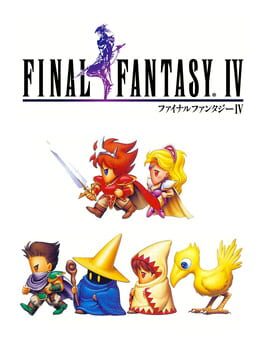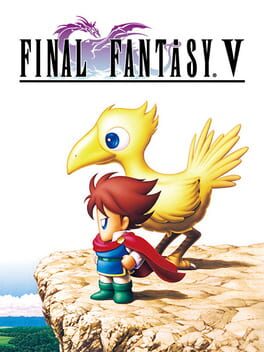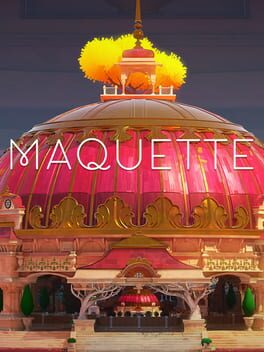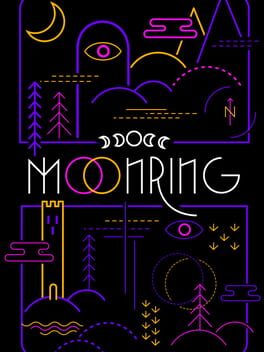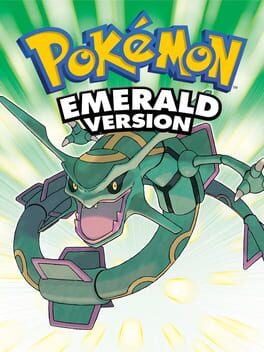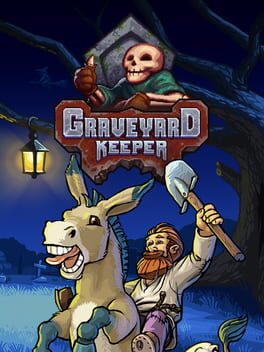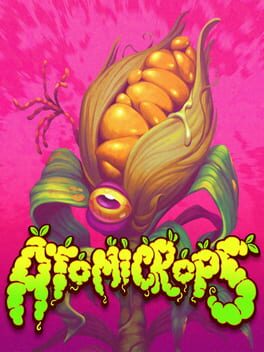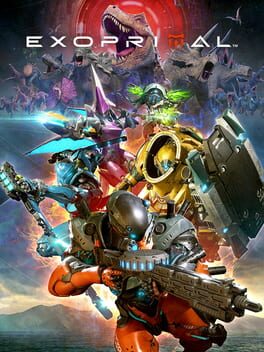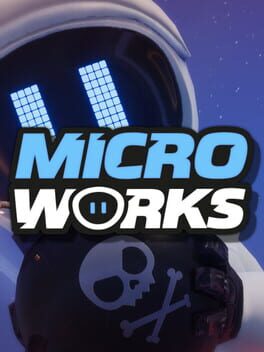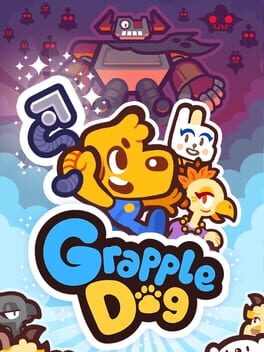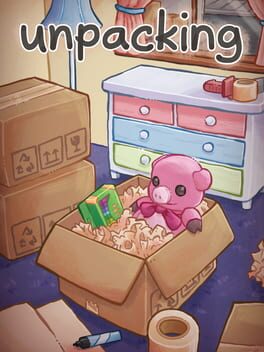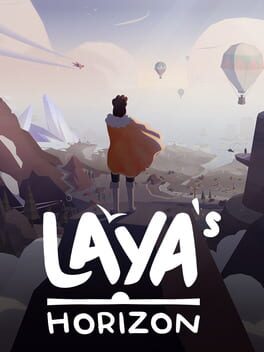EffieArtoria
1991
I first played this after playing V and VI, and I didn't think much of it. Re-playing it after I, II and III on the Famicom it's easier to see what the game does right. This is the first Final Fantasy, in my opinion, that really crafts a story with characters that you can follow with strong narrative peaks and troughs. I genuinely teared up a little when the prologue theme plays before the final battle- when all your allies throughout the game come to your aid.
Mechanically, this is the first game to use the ATB (Active Time Battle) that would become standard for the next 5 games. It doesn't feel quite perfect here, but the combat still feels smooth and fun compared to its predecessors. It feels a real shame that they walked back from the complexities of the Job system in III. You basically have no agency over how your party grows and develops- the only direction is up, more levels, better gear. In the original release you don't even get to choose your party composition, and are stuck with a fixed set of 5 characters for the end of the game. It's a crime that my beautiful Edward has to sit out the finale while the odious Edge and Kain are stinking up my party.
I'd still think this were an overall improvement over Final Fantasy III if not for one more thing. Caves & Mountains. Almost every dungeon in the game- and there are many- is a variation on a cave or a mountain. The technology & the talent are there to create beautiful environments, but someone decided there would be no cool cog dungeons, dense jungles, ruined libraries or heck, even a sewer. Instead we get brown caves, blue caves, red caves and silver caves.
Mechanically, this is the first game to use the ATB (Active Time Battle) that would become standard for the next 5 games. It doesn't feel quite perfect here, but the combat still feels smooth and fun compared to its predecessors. It feels a real shame that they walked back from the complexities of the Job system in III. You basically have no agency over how your party grows and develops- the only direction is up, more levels, better gear. In the original release you don't even get to choose your party composition, and are stuck with a fixed set of 5 characters for the end of the game. It's a crime that my beautiful Edward has to sit out the finale while the odious Edge and Kain are stinking up my party.
I'd still think this were an overall improvement over Final Fantasy III if not for one more thing. Caves & Mountains. Almost every dungeon in the game- and there are many- is a variation on a cave or a mountain. The technology & the talent are there to create beautiful environments, but someone decided there would be no cool cog dungeons, dense jungles, ruined libraries or heck, even a sewer. Instead we get brown caves, blue caves, red caves and silver caves.
1992
One of my favourite games of all time, an absolute gem and a huge highlight of the Final Fantasy series. This has the most mechanical depth of all the 2D Final Fantasies and introduces a huge amount of sidequesting and optional extras and powerups not present in IV. Beyond that it has a fantastic variety of dungeons, brought to life with excellent pixel art and music. The Ancient Library, the Ronka Ruins, Exdeath's fleshy castle, all great.
I won't wax lyrical about the Job system because it's already famous, but it's extremely good and the innovations this game offers over Final Fantasy III are huge. It's no surprise that the system is so enduring it pops in up X-2, or forms the foundation for the Bravely games.
This is also the only game where I've found Blue Magic to be super good, I don't think Square Enix captured it again on the Playstation os PS2.
One area where it falls down is the writing and characterisation, compared to IV and VI. The main characters feel thinly characterised, and while there are a couple of big revelations for them early on, they generally don't grow or change much or have strong individual relationships beyond direct familial ties. The supporting cast is small, and undermined by the fact that characters from the first act can't appear in the second act and vis-versa. Sympathetic characters like the Warriors of Dawn are introduced too late, while Cid & Mid are offscreen for too long. It feels much closer to III in terms of storytelling, and that's a big step back.
Still, I love the mechanics and presentation of this game so much I cannot give it less than a perfect score. An all timer, if you like old school JRPGs you've got to give this one a try.
I won't wax lyrical about the Job system because it's already famous, but it's extremely good and the innovations this game offers over Final Fantasy III are huge. It's no surprise that the system is so enduring it pops in up X-2, or forms the foundation for the Bravely games.
This is also the only game where I've found Blue Magic to be super good, I don't think Square Enix captured it again on the Playstation os PS2.
One area where it falls down is the writing and characterisation, compared to IV and VI. The main characters feel thinly characterised, and while there are a couple of big revelations for them early on, they generally don't grow or change much or have strong individual relationships beyond direct familial ties. The supporting cast is small, and undermined by the fact that characters from the first act can't appear in the second act and vis-versa. Sympathetic characters like the Warriors of Dawn are introduced too late, while Cid & Mid are offscreen for too long. It feels much closer to III in terms of storytelling, and that's a big step back.
Still, I love the mechanics and presentation of this game so much I cannot give it less than a perfect score. An all timer, if you like old school JRPGs you've got to give this one a try.
1999
I have a big soft spot for this game, but I think it doesn't quite hold up as well as its peers. There's a lot to love. The game has the most amazing, most cinematic, most bombastic set pieces in the series up to this point. X-ATM 092 chasing you through Dollet, the parade assassination, the battle of the gardens, the lunar cry. Junctioning and drawing, min-maxing your stats, I love it all.
The problem is the whole isn't quite the sum of its parts. The plot connecting the set pieces is just not as good as the set pieces themselves. The Battle of the Gardens, for instance, happens more-or-less because the Gardens bump into each other. There are no particular stakes to it, it doesn't change anything, and it doesn't feel very connected to the next plot beat (Rinoa going into a coma). The revelation that all the main characters are amnesiac orphans is just thrown out by Irvine at no point in particular. I have a friend who's fond of saying the game needed a second draft. I'm inclined to agree.
Mechanically, it feels the complete opposite of its predecessor, where materia started out simple and had you waiting half the game to get interesting, Guardian Force and junctioning are super complicated right out the gate, but fail to really develop or evolve as the game goes on. I found the game most difficult at the start, then super easy right up until Omega Weapon. My biggest disappointment here is there's no real incentive to specialise or diversify, I ended the game with three beefcakes who could smack enemies hard with the fight command and absorb any amount of punishment. Still really chasing the SNES peak where I could spread out all the game's toys between the full party.
Still, a good time, and I'd love to see it revisited someday to redraft the rougher bits of the story. If you haven't played it, here's my advice: unlock "Encounter None" on Diabolos and never, ever feel bad about using it!
The problem is the whole isn't quite the sum of its parts. The plot connecting the set pieces is just not as good as the set pieces themselves. The Battle of the Gardens, for instance, happens more-or-less because the Gardens bump into each other. There are no particular stakes to it, it doesn't change anything, and it doesn't feel very connected to the next plot beat (Rinoa going into a coma). The revelation that all the main characters are amnesiac orphans is just thrown out by Irvine at no point in particular. I have a friend who's fond of saying the game needed a second draft. I'm inclined to agree.
Mechanically, it feels the complete opposite of its predecessor, where materia started out simple and had you waiting half the game to get interesting, Guardian Force and junctioning are super complicated right out the gate, but fail to really develop or evolve as the game goes on. I found the game most difficult at the start, then super easy right up until Omega Weapon. My biggest disappointment here is there's no real incentive to specialise or diversify, I ended the game with three beefcakes who could smack enemies hard with the fight command and absorb any amount of punishment. Still really chasing the SNES peak where I could spread out all the game's toys between the full party.
Still, a good time, and I'd love to see it revisited someday to redraft the rougher bits of the story. If you haven't played it, here's my advice: unlock "Encounter None" on Diabolos and never, ever feel bad about using it!
2021
The main gimmick is really cool and cute, this is what attracted me to the game. However, playing it, there were a lot of really slow, basic puzzles stretched out that didn't make me feel like I was doing anything clever. All the pacing is bogged down by a story told in voice over that isn't particularly interesting, and it often felt like I had to pause my fun puzzle solving to wait for a divorcee's audiobook to play.
2023
Really delightful homage to Ultima games, there's so many good ideas packed together. Fantastic exploration and discovery. Would recommend giving it a go for half an hour if you are interested in RPG design or a fan of older games, it's free, and I think if you don't like it you'll bounce off it very quickly. On the other hand, you could be drawn in for a wonderful time.
I did find that later on the game started to drag. There are roguelike generated dungeons that take a long time to explore and reset your progress if you die, but eventually these stop being rewarding or challenging in an interesting way and just feel like huge RNG time sinks. I thought these were optional for a while and avoided them while exploring the other mysteries that interested me much more, but eventually they're mandatory. I put the game down for good after spending hours banging my head against one of these dungeons that just kept crashing and losing all my progress.
Still, fantastic game and I still recommend it!
I did find that later on the game started to drag. There are roguelike generated dungeons that take a long time to explore and reset your progress if you die, but eventually these stop being rewarding or challenging in an interesting way and just feel like huge RNG time sinks. I thought these were optional for a while and avoided them while exploring the other mysteries that interested me much more, but eventually they're mandatory. I put the game down for good after spending hours banging my head against one of these dungeons that just kept crashing and losing all my progress.
Still, fantastic game and I still recommend it!
I had a pretty good time replaying Fire Red, even though I never really got into Gen III, and decided to play through Emerald hoping I'd like it more than Sapphire. However, I still find it quite a drag to play through, so few of the pokemon on offer feel fun or cool. Most pokemon still take ages to learn half decent moves. The soundtrack is, I guess, trying its hardest to squeeze a variety of instruments onto the GBA sound chip, but the results are really poor- FR/LG sounds much, much better, and the tracks from this game won't be good until they're revisited in ORAS.
I still need to come back and try the Battle Frontier stuff to see if that gives it another lease on life, but I struggle to find time for it.
I still need to come back and try the Battle Frontier stuff to see if that gives it another lease on life, but I struggle to find time for it.
2018
Played this for 8 hours and even now I feel a certain compulsion to go back for more, to unlock a bit more research or build the next thing... but I've never had any fun with the damn thing. It's all RPG Progression loops on top of ultimately bland activities. Walk here and hold X for 5 seconds to chop. Walk here and hold X to build. Walk for 5 minutes to find an NPC who'll ask you to walk to the other side of the map and hold X to get some moths. It's Stardew without a satisfying core loop or a division between short and longterm goals.
There's a bizarre lack of signposting where vital skills are completely locked behind talking to a faceless NPC somewhere, and in the meantime your gormless protagonist can hold an shovel in his hand in front of a mound of sand saying "Technology required" to do this. MATE. It's a mound of sand, start digging.
The graveyard element also seems oddly peripheral. I spent the majority of my time playing the game chopping wood, planting crops and breaking rocks. There's so much Stardew stuff included that gets in the way of a very fun premise.
The story's also just a non-starter which made me disinclined to interact with any of the NPCs.
There's a bizarre lack of signposting where vital skills are completely locked behind talking to a faceless NPC somewhere, and in the meantime your gormless protagonist can hold an shovel in his hand in front of a mound of sand saying "Technology required" to do this. MATE. It's a mound of sand, start digging.
The graveyard element also seems oddly peripheral. I spent the majority of my time playing the game chopping wood, planting crops and breaking rocks. There's so much Stardew stuff included that gets in the way of a very fun premise.
The story's also just a non-starter which made me disinclined to interact with any of the NPCs.
2020
A bit hard to get into - there's SO MUCH going on at the very start that it doesn't explain particularly well, and it's not immediately obvious what the emphasis of the game is. But once you get into the swing of things, it's great Roguelite fun, packing away powerups and shoveling handfuls of seed down as fast as you can. Visual style is gorgeous, if a bit noisy, and the music is fun.
2023
There's a lot of big ideas in this one, it really feels like they're trying a lot of stuff. Some of it works, some of it really doesn't. A kinda hero shooter PVE game where you fight MASSIVE waves of dinosaurs- dinos moving like a fluid there are so many of them - that works. That rules. All the progression gated behind story progress in a multiplayer game... that doesn't work so well! There are a couple of modes that are absolutely great, I remember a moment where everything clicked and I thought "oh! all this character's abilities seem good and useful in this context", but you don't get to choose what mode you're playing, it's all random/progression locked, so I only saw it twice in about 8 hours with the game.
Kinda hope it keeps going, I played it on Gamepass and had a pretty good time of it, might give it another shot in future.
Kinda hope it keeps going, I played it on Gamepass and had a pretty good time of it, might give it another shot in future.
2022
Sort of like a multiplayer Wario-Ware. The games are super short but the sessions are super long. It's all pretty random - did the button spawn right next to you? Were you already moving when the "don't move" challenge came up? It's fun in short doses with pals, but I found the length of the sessions and the tendency for strangers to show up and stomp everyone pretty lousy. The longer session "boss" games are even more hit or miss, with some mediocre shooting games mixed in that really kill the pace!
2022
Very cute, adore the art style. The music is like peak 90s Sonic CD energy, it's absolutely great in small doses - unfortunately it's on a pretty short loop and the same track will be used over multiple levels, meaning it gets old fast.
I have two complaints about the gameplay that made me put it down. The first is... it's Grapple Dog, but it doesn't seem to be sufficiently about using the grappling hook? There are long platforming sections about wall jumping, or swimming, or whatever, where you can't use the hook at all. It is only compatible with specially designated blue blocks. It's like a Spider-Man game where you spend more than half your time running at ground level.
The other issue was, I just found it frustrating when the difficulty ramped up. I repeated sections multiple times, trying to loop around for the purple gems and scoop up 100% of the fruit, but getting nicked on spikes and death pits, and it just had that feeling of "I can't believe I have to do this huge diversion to get the gem AGAIN". Contrasts poorly for me with Pizza Tower which also incentivises you to zoom through the level collecting all the stuff ASAP but is much more generous with player durability.
I have two complaints about the gameplay that made me put it down. The first is... it's Grapple Dog, but it doesn't seem to be sufficiently about using the grappling hook? There are long platforming sections about wall jumping, or swimming, or whatever, where you can't use the hook at all. It is only compatible with specially designated blue blocks. It's like a Spider-Man game where you spend more than half your time running at ground level.
The other issue was, I just found it frustrating when the difficulty ramped up. I repeated sections multiple times, trying to loop around for the purple gems and scoop up 100% of the fruit, but getting nicked on spikes and death pits, and it just had that feeling of "I can't believe I have to do this huge diversion to get the gem AGAIN". Contrasts poorly for me with Pizza Tower which also incentivises you to zoom through the level collecting all the stuff ASAP but is much more generous with player durability.
2023
I was so excited when it was announced Naoki Yoshida would be helming Final Fantasy XVI. I love XIV, so the director helming a main series title without any of the constraints of an MMO sounded fantastic. It’s the first Final Fantasy I’ve bought at launch since the Playstation 2. But, I really don’t enjoy saying it. I hate XVI. I hate it so much it reflects back on XIV, drawing attention to any shortcoming that was present there, now blown up to massive proportions.
Maybe the biggest issue is how much of the core gameplay is lifted from the MMO. If you’re not in a dungeon or a cutscene, you’re doing quests, and they’re all MMO sidequests. Find the NPC with a marker, click through their dialogue, move to the next NPC, repeat. Kill three badgers. Pick up five motes of sand. Etcetera. It’s all busywork, it all feels pointless. Despite the fact that the quests are non-stop talking, you have no control over dialogue. This is a game that in many ways wants to be the Witcher 3, but misses the real essentials there of giving you agency over how you engage with the story. This felt acceptable in XIV where a branching story doesn’t really work with a shared world, but here it just feels like a mistake.
The fact the story is totally linear might not be so bad if it weren’t also just very badly written. There’s a long first act where the game pokes at different threads- Clive’s quest for revenge, mystery, redemption, but then settles into a very formulaic quest to break crystals that fills almost the entire rest of the game. Every part of it feels thinly written. It’s hard to pick what to focus on here- the mysteries with obvious solutions, the politics that stop existing the moment you look away from them, or the world changing actions that never seem to have any consequences. What I kept coming back to is the heroes’ plan to end slavery. Magic users are enslaved in the world of XVI, you see, and Cid has a plan to save them. It doesn’t, by and large, involve breaking chains or forming a free magic nation or anything like that. The plan is to destroy the mother crystals, which allow normal people to use magic, and cause the ecological disaster creeping across the land. This will end slavery, you see, because- well- actually- it’ll make the slavery much much worse, because as the crystals disappear the discrimination against magic users will become even more cruel. But then, somehow, eventually, the slavery will be over. Trust us!
If you think that’s not a particularly deft handling of an issue, it’s a theme. The way women are handled in this game is dreadful. There are three principal female characters in the game, and you’ll see all of them naked before the story is over. Two are villainous schemers whose overt sexuality is framed as duplicitous and evil, seducing dopey lads into doing their bidding. The third is Clive’s virginal companion, Jill. Jill spends large chunks of the game convalescing, the writers switching her off whenever they can’t be bothered with her around. When she is there, she’s usually just standing behind Clive looking supportive. Even at the culmination of her own revenge arc she’s incapacitated by a random boss monster and needs Clive to save the day. This woman embodies the power of a Nuclear Warhead. But she gets off the best- the others receive brutal deaths as retribution for being too sexy. Joke all you want about Tifa Lockhart’s chest, as a character she had a lot going on, an arc, a unique personality, agency. XVI is the worst the series has been for women since Final Fantasy II.
I could go on. The RPG progression is so token as to be pointless. Same for the crafting, and the economy. The world feels absolutely tiny, you can walk from one end of the continent to another in about 5 minutes. There’s a really confused ecological message where maybe global warming is bad, but it’s definitely not society’s fault. And so on, and so on.
For all my complaints, there were still things I like. It’s graphically very impressive. The boss fights are the obvious centre piece and they’re very cool, gigantic dragons and demons sparring amidst a sea of flames, grinding down stone tendrils to smash the arms off a titan. I found myself caring about Gav and Clive’s silly old uncle, even if I didn’t care for the protagonist himself. But when I look back across every Final Fantasy game I’ve played, there’s no game I want to replay less than this.
Maybe the biggest issue is how much of the core gameplay is lifted from the MMO. If you’re not in a dungeon or a cutscene, you’re doing quests, and they’re all MMO sidequests. Find the NPC with a marker, click through their dialogue, move to the next NPC, repeat. Kill three badgers. Pick up five motes of sand. Etcetera. It’s all busywork, it all feels pointless. Despite the fact that the quests are non-stop talking, you have no control over dialogue. This is a game that in many ways wants to be the Witcher 3, but misses the real essentials there of giving you agency over how you engage with the story. This felt acceptable in XIV where a branching story doesn’t really work with a shared world, but here it just feels like a mistake.
The fact the story is totally linear might not be so bad if it weren’t also just very badly written. There’s a long first act where the game pokes at different threads- Clive’s quest for revenge, mystery, redemption, but then settles into a very formulaic quest to break crystals that fills almost the entire rest of the game. Every part of it feels thinly written. It’s hard to pick what to focus on here- the mysteries with obvious solutions, the politics that stop existing the moment you look away from them, or the world changing actions that never seem to have any consequences. What I kept coming back to is the heroes’ plan to end slavery. Magic users are enslaved in the world of XVI, you see, and Cid has a plan to save them. It doesn’t, by and large, involve breaking chains or forming a free magic nation or anything like that. The plan is to destroy the mother crystals, which allow normal people to use magic, and cause the ecological disaster creeping across the land. This will end slavery, you see, because- well- actually- it’ll make the slavery much much worse, because as the crystals disappear the discrimination against magic users will become even more cruel. But then, somehow, eventually, the slavery will be over. Trust us!
If you think that’s not a particularly deft handling of an issue, it’s a theme. The way women are handled in this game is dreadful. There are three principal female characters in the game, and you’ll see all of them naked before the story is over. Two are villainous schemers whose overt sexuality is framed as duplicitous and evil, seducing dopey lads into doing their bidding. The third is Clive’s virginal companion, Jill. Jill spends large chunks of the game convalescing, the writers switching her off whenever they can’t be bothered with her around. When she is there, she’s usually just standing behind Clive looking supportive. Even at the culmination of her own revenge arc she’s incapacitated by a random boss monster and needs Clive to save the day. This woman embodies the power of a Nuclear Warhead. But she gets off the best- the others receive brutal deaths as retribution for being too sexy. Joke all you want about Tifa Lockhart’s chest, as a character she had a lot going on, an arc, a unique personality, agency. XVI is the worst the series has been for women since Final Fantasy II.
I could go on. The RPG progression is so token as to be pointless. Same for the crafting, and the economy. The world feels absolutely tiny, you can walk from one end of the continent to another in about 5 minutes. There’s a really confused ecological message where maybe global warming is bad, but it’s definitely not society’s fault. And so on, and so on.
For all my complaints, there were still things I like. It’s graphically very impressive. The boss fights are the obvious centre piece and they’re very cool, gigantic dragons and demons sparring amidst a sea of flames, grinding down stone tendrils to smash the arms off a titan. I found myself caring about Gav and Clive’s silly old uncle, even if I didn’t care for the protagonist himself. But when I look back across every Final Fantasy game I’ve played, there’s no game I want to replay less than this.
2021
Lovely little game, chill vibes, you can finish it in an afternoon. There are times when it feels like there is just too much stuff to move in a given level, but midway through the story started to hook me. It's a really fun approach- the story is told more or less entirely by the things you're unpacking and the home you're fitting them into. It's quite enjoyable to see the possessions moving into and out of the player character's life and extrapolate what that means for her. And it's queer!
Still on gamepass, well worth a download to check out for yourself.
Still on gamepass, well worth a download to check out for yourself.
2023
This game is an absolute gem, huge and filled with wonder. After nearly two hundred hours I’ve hundred-percented the main objectives of the game and still feel like I’ve got so much left to do, optional bosses, trials, major quests. I find myself wanting to put the game down because I have other things to play, other things to do, but struggling, because it’s just so damn fun, and it seems to go on forever.
And yet, there’s a niggling thought in the back of my mind. Is this better than Breath of the Wild? If Breath of the Wild was a hugely innovative title for the series, does Tears of the Kingdom achieve the same novelty? My gut feeling is no to that second question. Breath of the Wild was radical, Tears of the Kingdom is an expansion on that foundation. In many ways it is better. In a few ways I think it is worse.
The biggest improvement - there’s just more stuff, more things to find, and really pleasant layers of interaction and reinforcement. Exploring the Depths helps you locate shrines on the surface and rewards you with the powerful resource zonaite. But you need to explore surface level caves to stock up on the brightbloom seeds needed to navigate pitch black Depths, and sungrass from sky islands can cure you of gloom underground. Treasure maps in sky islands lead to loot in the Depths. Etcetera, etcetera. In the first game I never bothered hunting down every last shrine knowing pinning down the last few would be a nightmare. In Tears, because of the lightroot-shrine interaction it felt much more achievable to pin down every last shrine, even if some of them still required a careful search.
Beyond that, the boss fights in the first game are largely unremarkable. I watched a speedrun recently and thought “Oh yeah. Ganon Blights.” They’re an entirely forgettable part of the experience. The Tears bosses on the other hand are fun and stay true to the kind of free form puzzle solving the game is all about.
Where I think the game stumbles is in the story and the gating around that story. Breath of the Wild offered a tremendous amount of freedom. It was innovative in the open world genre in how it allowed you to go everywhere and do everything in whatever order you wanted, and still created a compelling narrative through very small elements. For the most part Tears of the Kingdom stays true to that freedom, but there are issues. Instead of cutting you loose after the tutorial like its predecessor, Tears delivers you to a quest giver NPC who not only gives you a laundry list of chores, but expects you to check in again when you’re done. If you eschew this main quest you’ll find certain content gated, something that I don’t remember happening in Breath.
I suspect this is a course correction. A reaction to feedback. Some players lost the thread in Breath of the Wild and put it down. I understand, but it hurts the core of Breath of the Wild which was so strong for me. That game had a lonesome atmosphere to it, a sense of traversing a wild, ruined land, sensing the human toll of the century-old calamity you failed to stop. Tears on the other hand feels crowded. The number of NPCs isn’t dramatically higher, but they’re much more central to the game’s story. Moreover, Breath managed to make its slight story seem personal through that atmosphere. Link is a taciturn figure alone in a huge world and that’s how you’ll play much of the game. The main plot is retreading Link’s footsteps to restore his amnesiac memories. I felt much closer to him in the first game, and much, much closer to Zelda.
Zelda is, I’m afraid to say, one of the biggest downgrades. In a few short minutes of its runtime Breath gave Zelda an arc, a sense of depth and tragedy. She was a nerdy Princess, bowed by expectations, who rose to the challenge too late. In Tears, she’s a potted plant, removed from the game early on so that she can be an observer, not an active participant, to the game’s backstory. While there are some key details in her story that are incredibly cool, her character feels one dimensional and a huge step backwards, repeating the same beats but without the weight it had the first time around.
Repetition is, unfortunately, a bit of a theme with the story. This is the first Zelda game that’s a direct sequel in the same place with the same characters. Nobody ever seems to ask the obvious questions - “Is Ganondorf related to Calamity Ganon?” - or comments on the strange symmetry of their lives “Wow, I had ANOTHER ancestor who wanted to give me an ancient magic power to help you Link? What are the chances.” It’s a problem invited by the reuse of the setting, and one I wish they did more to avoid. Some things become truly bizarre when you stop and think about them - Sidon, for instance, has apparently demolished the statue of his dead sister, a war hero who gave her life protecting the Zora, to replace it with a statue of Link riding Sidon. Some might call that disrespectful, but I guess the Zora understand that he’s got it Down Bad for Link.
That’s a lot of words to describe what, in the grand scheme of things are very minor problems. The game is so big with so much in it that it’s hard to talk about everything I love. I feel bound to note the contrast with its predecessor, but if you enjoyed that game you will enjoy the sequel, and if they made another one in five years I’d sink another hundred hours into it.
And yet, there’s a niggling thought in the back of my mind. Is this better than Breath of the Wild? If Breath of the Wild was a hugely innovative title for the series, does Tears of the Kingdom achieve the same novelty? My gut feeling is no to that second question. Breath of the Wild was radical, Tears of the Kingdom is an expansion on that foundation. In many ways it is better. In a few ways I think it is worse.
The biggest improvement - there’s just more stuff, more things to find, and really pleasant layers of interaction and reinforcement. Exploring the Depths helps you locate shrines on the surface and rewards you with the powerful resource zonaite. But you need to explore surface level caves to stock up on the brightbloom seeds needed to navigate pitch black Depths, and sungrass from sky islands can cure you of gloom underground. Treasure maps in sky islands lead to loot in the Depths. Etcetera, etcetera. In the first game I never bothered hunting down every last shrine knowing pinning down the last few would be a nightmare. In Tears, because of the lightroot-shrine interaction it felt much more achievable to pin down every last shrine, even if some of them still required a careful search.
Beyond that, the boss fights in the first game are largely unremarkable. I watched a speedrun recently and thought “Oh yeah. Ganon Blights.” They’re an entirely forgettable part of the experience. The Tears bosses on the other hand are fun and stay true to the kind of free form puzzle solving the game is all about.
Where I think the game stumbles is in the story and the gating around that story. Breath of the Wild offered a tremendous amount of freedom. It was innovative in the open world genre in how it allowed you to go everywhere and do everything in whatever order you wanted, and still created a compelling narrative through very small elements. For the most part Tears of the Kingdom stays true to that freedom, but there are issues. Instead of cutting you loose after the tutorial like its predecessor, Tears delivers you to a quest giver NPC who not only gives you a laundry list of chores, but expects you to check in again when you’re done. If you eschew this main quest you’ll find certain content gated, something that I don’t remember happening in Breath.
I suspect this is a course correction. A reaction to feedback. Some players lost the thread in Breath of the Wild and put it down. I understand, but it hurts the core of Breath of the Wild which was so strong for me. That game had a lonesome atmosphere to it, a sense of traversing a wild, ruined land, sensing the human toll of the century-old calamity you failed to stop. Tears on the other hand feels crowded. The number of NPCs isn’t dramatically higher, but they’re much more central to the game’s story. Moreover, Breath managed to make its slight story seem personal through that atmosphere. Link is a taciturn figure alone in a huge world and that’s how you’ll play much of the game. The main plot is retreading Link’s footsteps to restore his amnesiac memories. I felt much closer to him in the first game, and much, much closer to Zelda.
Zelda is, I’m afraid to say, one of the biggest downgrades. In a few short minutes of its runtime Breath gave Zelda an arc, a sense of depth and tragedy. She was a nerdy Princess, bowed by expectations, who rose to the challenge too late. In Tears, she’s a potted plant, removed from the game early on so that she can be an observer, not an active participant, to the game’s backstory. While there are some key details in her story that are incredibly cool, her character feels one dimensional and a huge step backwards, repeating the same beats but without the weight it had the first time around.
Repetition is, unfortunately, a bit of a theme with the story. This is the first Zelda game that’s a direct sequel in the same place with the same characters. Nobody ever seems to ask the obvious questions - “Is Ganondorf related to Calamity Ganon?” - or comments on the strange symmetry of their lives “Wow, I had ANOTHER ancestor who wanted to give me an ancient magic power to help you Link? What are the chances.” It’s a problem invited by the reuse of the setting, and one I wish they did more to avoid. Some things become truly bizarre when you stop and think about them - Sidon, for instance, has apparently demolished the statue of his dead sister, a war hero who gave her life protecting the Zora, to replace it with a statue of Link riding Sidon. Some might call that disrespectful, but I guess the Zora understand that he’s got it Down Bad for Link.
That’s a lot of words to describe what, in the grand scheme of things are very minor problems. The game is so big with so much in it that it’s hard to talk about everything I love. I feel bound to note the contrast with its predecessor, but if you enjoyed that game you will enjoy the sequel, and if they made another one in five years I’d sink another hundred hours into it.
